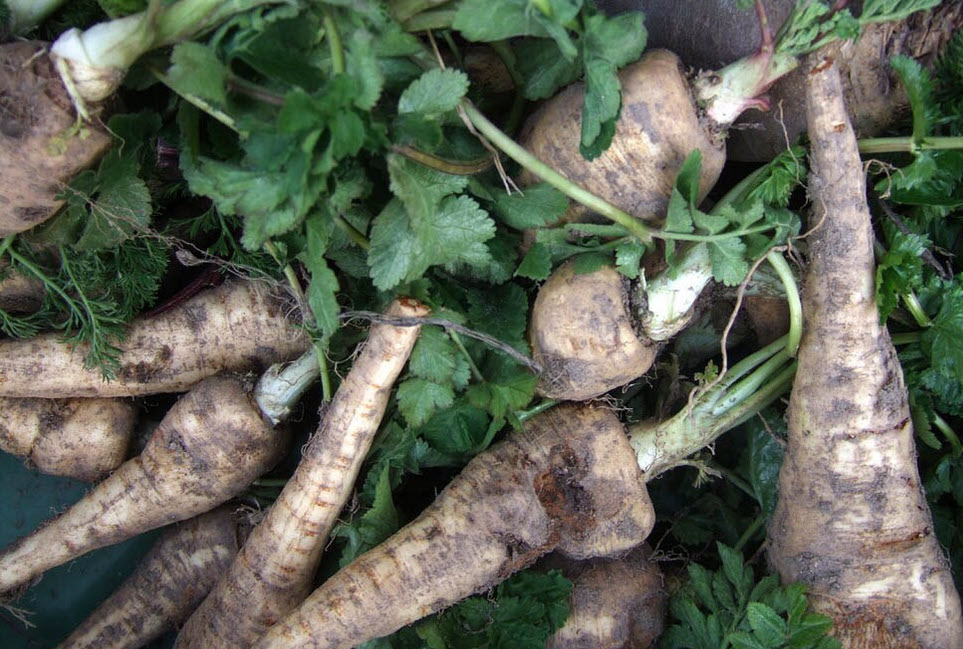Horseradish: A Potent Root for Your Health
There are many health benefits of horseradish from relieving respiratory issues to boosting your immune system. The benefits are both impressive and scientifically supported. Read on…

Zyance, CC BY-SA 2.5, via Wikimedia Commons (image cropped)
Health Benefits: How Horseradish Works Wonders
Horseradish is rich in nutrients and bioactive compounds that offer a variety of health benefits. One of the main advantages of horseradish is its ability to aid in sinus and respiratory health.
The root contains compounds that act as natural antibiotics, helping to clear sinus passages and alleviate congestion.
This is particularly beneficial for those suffering from colds, flu, or sinus infections.
Boosting Digestion and Detoxification
This fiery root stimulates digestion by increasing saliva, bile, and gastric secretions, which helps in breaking down food more efficiently.
Additionally, horseradish can activate liver enzymes, aiding in detoxification processes and improving overall liver health.
Antibacterial Properties
Horseradish has significant antibacterial properties, making it effective against a range of pathogens. This is largely due to its high content of allyl isothiocyanate, a compound that has been shown to combat bacteria like Listeria, E. coli, and Staphylococcus aureus.
Traditional Uses and Modern Remedies
Traditionally, horseradish has been used in folk medicine to treat everything from urinary tract infections to arthritis pain.
Today, it continues to be a staple in herbal remedies due to its potent antibacterial and anti-inflammatory properties.
Health Benefits of Horseradish – Supporting Research
Several studies have highlighted the health benefits of horseradish.
For instance, research has shown that the compounds in horseradish can help inhibit the growth of bacteria, potentially reducing the risk of infections.
Other studies have noted its effectiveness in improving respiratory health by helping to clear mucus from the airways.
Key Constituents and Their Actions
The power of horseradish lies in its complex mix of nutrients and chemical compounds, including:
- Glucosinolates: Precursors to isothiocyanates that have cancer-preventive properties.
- Vitamin C: An antioxidant that boosts the immune system and skin health.
- Folate: Important for DNA synthesis and repair.
- Potassium: Essential for proper cell function and blood pressure regulation.
These constituents work synergistically to improve health and prevent disease.
Horseradish is also noted for its potential benefits in preventing and treating Urinary Tract Infections (UTIs). This is primarily due to its antibacterial properties, which can be particularly effective against bacteria that commonly cause UTIs, such as E. coli.
How Horseradish Helps with UTIs:
Antibacterial Action:
The root contains compounds like allyl isothiocyanate, which has strong antibacterial properties. These compounds can inhibit the growth and adherence of bacteria to the urinary tract walls, thereby helping to prevent and clear infections.
Diuretic Effect:
Horseradish has a mild diuretic effect, meaning it helps to increase urine flow. This flushing mechanism can help to wash out bacteria from the urinary tract, reducing the risk of infection and helping to clear existing infections faster.
Using Horseradish for UTIs:
To utilize horseradish for UTIs, it is typically recommended to consume it in food form. Adding fresh, grated horseradish to meals or using a small amount of horseradish sauce can potentially help to manage and prevent UTIs.
However, it’s important to use it cautiously as it can be quite potent and may cause irritation in some people, especially if consumed in large amounts.
See other natural remedies that help with UTIs here.
Origin and Folklore
Horseradish is believed to have originated in Eastern Europe and Western Asia. According to folklore, the Delphic Oracle told Apollo that the horseradish was worth its weight in gold. Historically, it has been used both as a medicine and a food for thousands of years.
Incorporating Horseradish into Your Health Routine
Adding horseradish to your diet is simple. It can be grated fresh into dishes such as salads or used as a condiment with meat. Horseradish sauce is another popular option, especially alongside roast beef.
Side Note: I make potato chip dip with sour cream and horseradish. Have you tried it?
Precautions
While horseradish is beneficial for many, it should be consumed in moderation. High amounts can irritate the stomach and thyroid.
Those with kidney issues, or pregnant women, should consult with a healthcare provider before adding it to their diet.
The Plant
Horseradish is a perennial plant in the Brassicaceae family, which also includes mustard, wasabi, and cabbage. It grows up to 1.5 meters tall and is primarily cultivated for its large, white, tapering root.
Health Benefits of Horseradish
In conclusion, horseradish is not only a unique, spicy addition to your culinary repertoire but also a potent medicinal root that offers a plethora of health benefits.
By incorporating it into your diet, you can take advantage of its powerful properties to improve your health in natural and effective ways. Remember to use it judiciously and enjoy the zest it adds to your meals as well as your health.
